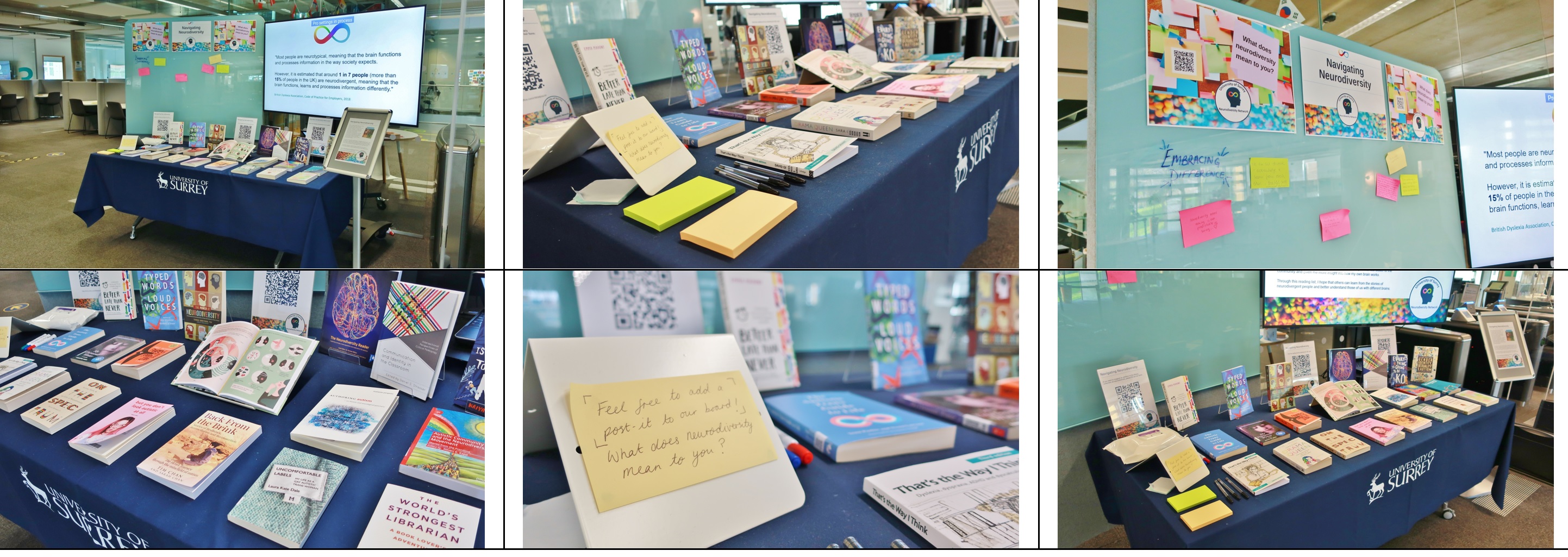Blog posts | Reading List | Photos | Social media
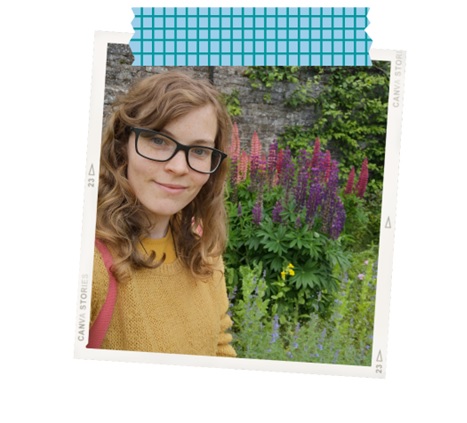
Blog Post 1: Hello! I’m Daisy Shearer and I am a Physics PhD student based at the Advanced Technology Institute. Before my PhD, I was an MPhys student here at Surrey. In the final year of my degree, I was diagnosed with autism spectrum disorder and have been heavily involved with the neurodivergent community since. I am also the founder of ‘Neurodivergent in STEM’ — a project which sheds light on the stories of neurodivergent people in STEM fields — and the founder of the University of Surrey Neurodiversity Network.
My autism diagnosis was a turning point in my life. It was the first time I realised that not everyone experiences the world in the same way as me. Up until then, I thought I was weak and useless for getting tired so easily and being overwhelmed by things as simple as basic household and self-care tasks. Framing my life in terms of me being autistic explained everything that I never understood about myself. It allowed me to start the long journey to self-acceptance and self-compassion. My diagnosis also meant I started accessing support from the wonderful Disability and Neurodiversity team who support me to this day.
I’m now more in tune with my mind and body, allowing myself to ‘unmask’ more when I feel safe to. This can mean not looking someone in the eyes when I’m talking to them or stimming freely when I am understimulated or overwhelmed. But I still have many challenges to overcome as being autistic within our current society can be disabling. I hope that through education on this topic we can move towards celebrating neurodiversity.
The theme of my student curation project is ‘Navigating Neurodiversity’. Since my diagnosis, reading about the experiences of other neurodivergent people from a range of different backgrounds and identities has helped me feel closer to the community and given me more insight into how my own brain works. Through this reading list, I hope that others can learn from the stories of neurodivergent people and better understand those of us with different brains.
I think that it’s so important to take an intersectional approach when it comes to equity in education, the workplace, and life in general. Recognising that everyone is different and we’re not homogeneous, whether neurodivergent or not, helps us empathise with others and provide appropriate support. I believe that this is the only way we can achieve equity in society.
As well as blogging throughout the week, I’ll be taking over the library Instagram where I’ll be hosting a Q&A so head over to @surreylib if you want to join in the conversation and ask me anything!
You can also read about neurodiversity at Surrey on the Neurodiversity at Surrey blog.
What is Neurodiversity?
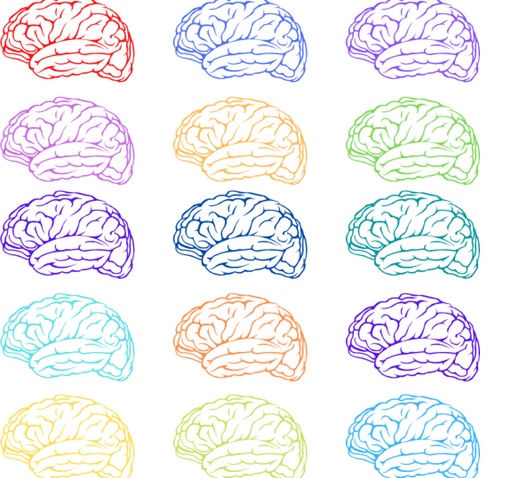
Blog Post 2: Neurodiversity is generally defined as ‘the diversity of human brains and minds – the infinite variation in neurocognitive functioning within our species.’ It can be thought of as analogous to biodiversity. The term itself is neutral and is simply a descriptive term. However, the neurodiversity paradigm and the neurodiversity movement are philosophical and political perspectives that emphasise embracing neurocognitive diversity and challenging the idea that there is a ‘normal’ type of brain. Through the neurodiversity paradigm, we embrace there is variation in neurotype within our species and no neurotype is more valid than any other. Rather than being a concept of division and othering, neurodiversity is all about connection and celebrating that we are a neurodiverse species.
It’s also a relatively new term; coined in the 1990s by sociologist Judy Singer. In her words:
“For me, the key significance of the Autism Spectrum lies in its call for and anticipation of a politics of neurological diversity, or ‘neurodiversity.’ The neurologically different represent a new addition to the familiar political categories of class/gender/race and will augment the insights of the social model of disability. The rise of neurodiversity takes postmodern fragmentation one step further. Just as the postmodern era sees every once too solid belief melt into air, even our most taken-for granted assumptions: that we all more or less see, feel, touch, hear, smell, and sort information, in more or less the same way, (unless visibly disabled) – are being dissolved.”
-Disability Discourse, Mairian Corker Ed., Open University Press, February 1, 1999, p 64
From this, we see that neurodiversity as a concept comes from a socio-political standpoint rather than a scientific standpoint. It also comes from lived experience as Singer is autistic herself. She expands on her thoughts on neurodiversity in this post.
Although Singer’s thesis focused on autism, the term ‘neurodiversity’ is now used more broadly as an umbrella term for people with neurodevelopmental differences. These include ADHD, autism, dyslexia, dyspraxia, dyscalculia, and Tourette’s syndrome (note that this is in no way a comprehensive list). These are often referred to as ‘neurodivergent conditions’ and one could describe people in this group as ‘NeuroMinorities’.
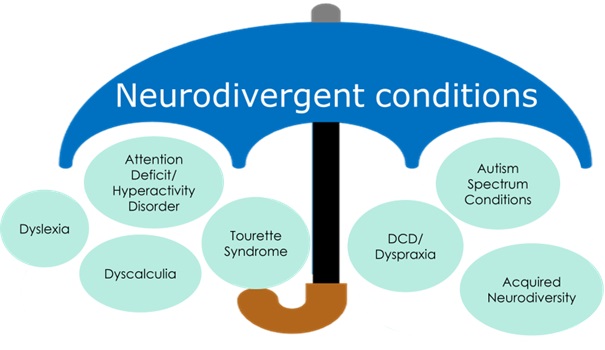
Because neurodiversity is a relatively new concept, its meaning is still being formed within our social consciousness. Many people point out the differences between the term neurodiversity itself, the neurodiversity paradigm, and the neurodiversity movement. This article defines some of these different terms but it should be noted that people sometimes use different definitions. For example, some people do refer to themselves as ‘neurodiverse’ even though linguistically it might make more sense to stick to just ‘neurodivergent’. While I try to stay consistent with how I use such terms, it’s important to acknowledge that as we are still forming the language to talk about these aspects of our species, things have and will change over time.
One core aspect of the neurodivergent experience that is often cited is that of a ‘spiky profile’. That is, in neurodivergent people we see a profile of skills and perceptions that is inconsistent, whereas neurotypical people tend to have a more even neurocognitive profile. For example, a neurodivergent person may have exceptional artistic and musical skills but lacks the ability to plan ahead and struggles with basic self-care. To find out more about this concept, this page from ‘Genius Within’ is worth reading. Neurodivergent people are wired differently and experience the world differently which means that sometimes we need support and adjustments to function in everyday society.
Want to read more about neurodiversity?
Check out our Neurodiversity Network Resource Padlet for lots of links to resources and the Neurodiversity at Surrey blog to hear what the neurodivergent community at Surrey has to say.
Celebrating neurodiversity at Surrey
Inspired by other equality, diversity, and inclusion initiatives at the university—such as the rainbow network– we recently established neurodiversity networks for staff and students. You can join a network as a member or as an ally to show your support for the neurodivergent community. The sign-up form can be found here and feel free to get in touch via email at studentNDnetwork@surrey.ac.uk or staffNDnetwork@surrey.ac.uk.
Challenging Stereotypes

Image caption: the ADHD foundation’s umbrella project celebrates the strengths that come from thinking differently
Blog Post 3: What comes to mind when you think of an autistic person? How about someone with ADHD? The chances are you had some thoughts going through your head that reflected the stereotypes around people with these conditions. I was the same. I thought that autistic people were mostly men, and nothing like me. They had trouble making eye contact and were obsessed with things like trains. I had no idea what autism actually is and until a close family member was diagnosed, I hadn’t tried to seek out information about what autism is can look like in different people. The same goes for other neurodivergent conditions too. I lived in ignorance of the variation of the human mind. Now I’m always in awe of the diverse ways that we perceive and interact with the world.
The neurodivergent community is incredibly diverse and different people present in different ways. A common phrase heard in autistic spaces is:
‘If you’ve met one autistic person, you’ve met one autistic person.’
Generalising from one experience can give you a warped view of a certain condition, characteristic or identity. This is even more evident when you consider the many different identities that people have. Intersectionality is an important factor to consider when discussing marginalization and intersecting identities. That’s why my reading list is filled with lots of memoirs from neurodivergent people with a myriad of intersecting identities. Reading and listening to different personal accounts of neurodivergence has helped me understand where our shared strengths and challenges are as well as how we differ. Although we all sit under the ‘neurodivergent umbrella’ we’re as diverse as the neurotypical population.
Explore the reading list to hear voices from across the neurodivergent community
Neurodiversity and Mental Health
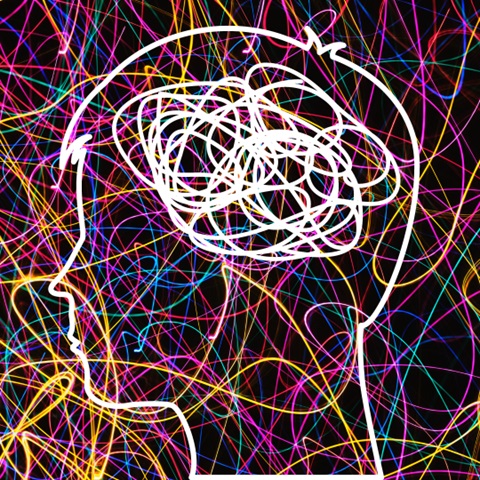
Blog Post 4: There are many factors that impact mental wellbeing and being in a minority group can put people at a higher risk of mental illness, and neurodivergent people are no exception. This phenomenon is known as minority stress and can be compounded by multiple intersecting identity characteristics. The stigma around neurodivergent conditions can lead to decreased self-worth, social isolation and higher rates of mental ill health.
In addition to minority stress, the sensory differences that many neurodivergent people experience are a huge source of anxiety as well as challenges around change. Mental health conditions like anxiety and depression are thus found very frequently as comorbidities with neurodivergent conditions. Many studies have found that the rate of anxiety and depression is much higher in neurodivergent populations than in the general population.
From personal experience, living in a world where everything tends to be too loud and confusing, and nothing is designed to suit the way you’re wired is really challenging. I’ve been diagnosed with generalised anxiety disorder and major depressive disorder alongside autism which is not a surprise at all to me. Many of my neurodivergent friends have the same (or similar) cocktail of mental health challenges to deal with on top of their neurodivergent experience.
Sometimes I find that my anxiety or depression is more disabling than being autistic but they all feed into each other in some ways. But while I think that being autistic has loads of positives, for me my mental illnesses are only negative. I would still be me if I didn’t have anxiety or depression, but I’d be so fundamentally changed if I wasn’t autistic that I would cease to be ‘Daisy’. I’m not saying that being autistic fully defines me, but it’s as much a part of my identity as say having blue eyes or being 5’3”. This is how neurodivergence and mental illness differ for me, but others may have a different outlook!
One thing that has been identified in recent years is the need for mental health services to adapt for neurodivergent people. Whether it’s ensuring that the sensory environment is appropriate, communicating clearly, or adapting the therapy itself, there’s plenty of evidence that some of us who are neurodivergent don’t respond to therapies such as Cognitive Behavioral Therapy in the same way. A different approach is needed that affirms our experiences and suits the way our brains are wired.
So how can you help? As always, support is crucial when it comes to mental wellbeing. For neurodivergent people, ensuring that their day-to-day anxiety is reduced can make a huge difference. As I mentioned, mental health conditions usually intertwine with neurodivergence and they can compound the challenges that arise from each other. Making sure that reasonable adjustments are in place promptly always helps a lot. It’s also worth just checking in with people occasionally! People can be very adept at masking their difficulties, but a kind word or a quick check-in can go a long way. You should also try to know where to signpost people who tell you that they’re struggling with their mental health. Here at Surrey we have the Centre for Wellbeing and for neurodivergent students the Disability and Neurodiversity team can help support with this too, even if it’s just facilitating contact with the CWB or other mental health services.
Some Useful Mental Health Services:
References and Resources:
Anxiety Disorders in Adults with Autism Spectrum Disorder: A Population-Based Study
Neurodiversity and Disability

Blog Post 5: Disability is always a bit of a stigmatised subject, and many people like to use euphemisms instead of the word ‘disability’. However, many disabled people find this quite offensive and infantilizing. When it comes to neurodiversity, it becomes even more complicated as not all neurodivergent people consider themselves to be disabled. So, the first thing to emphasise is that this blog (and the whole series of posts I’ve written) reflect my own personal thoughts. So, if you can, please do seek out the voices of other neurodivergent people! As I’ve mentioned before we are an incredibly diverse group and don’t all feel the same about things. I just hope that this project has sparked some new thoughts and discussions on these topics.
For me, I identify as disabled because legally I am. The equality act defines disability as:
‘a physical or a mental condition which has a substantial and long-term impact on your ability to do normal day to day activities.’
In this framing, being autistic is disabling for me because it does impact my ability to function in day-to-day life. Our society wasn’t built for neurodivergent minds, so we are often left overwhelmed and unable to function. I need some reasonable adjustments to function and thrive in life, both at home and in the workplace, and that’s okay!
Here’s where some of the nuance comes in: there are two main views of disability that are currently discussed in the literature: the social model and the medical model. The medical model views disabilities as symptoms and deficits which should be cured whereas the social model, which is popular within disability studies, says that:
‘a person is “disabled” when the (societal) environment doesn’t accommodate their needs. An example: in a world where ramps and elevators are everywhere, a wheelchair user isn’t “disabled,” because he/she/they can access all the same things as a person who walks: schools, jobs, restaurants, etc. However, providing equal opportunity doesn’t mean ignoring the differences and difficulties a wheelchair user may experience’
– Clearing Up Some Misconceptions about Neurodiversity, Scientific American
Personally, I very much align with the social model of disability. Being autistic doesn’t mean I’m deficient, but it does mean that I am disabled by my environment. Sometimes in a very profound way. For example, I can’t go to a supermarket most of the time because of the sensory challenges that it presents. Luckily, we have home delivery of groceries these days which helps overcome this challenge for me. I also have some reasonable adjustments as a PGR which really help support me in my work.
Sunflower Lanyards
The Surrey Sunflower Initiative supports people with hidden disabilities and/or invisible illnesses. This may include neurodivergent people who feel they are disabled by their neurotype in our current society.
If you see someone wearing a sunflower lanyard or badge, it means they may have additional needs that are not initially obvious. For neurodivergent people, this might be things like needing to leave lectures when overwhelmed or taking a little more time to process verbal information. When I wear my sunflower lanyard, I feel more able to stim freely which helps reduce sensory overwhelm.
Not everybody who has a hidden disability requires additional support, and not everybody who requires additional support will wear a sunflower lanyard or badge. You can learn more at: my.surrey.ac.uk/news/surrey-sunflower-initiative
Creating Community: What does neurodiversity mean to you?
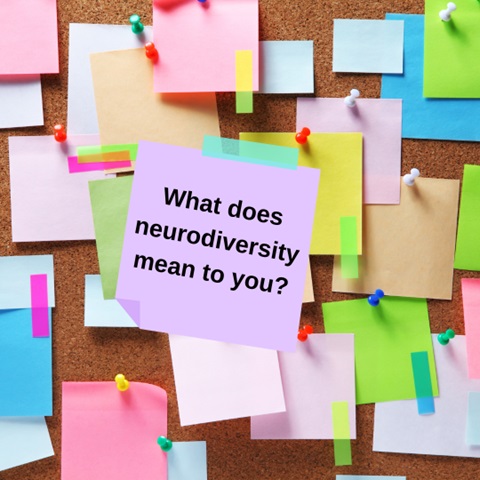
Blog Post 6: I asked neurodivergent people from around the university (both students and staff) what neurodiversity means to them. Here are some of their responses:
“To me, neurodiversity is about embracing different brains and working together to solve problems”
“In a word; creativity!”
“For me, “Neurodiversity” is a word that means a similar thing to “Biodiversity”, inasmuch as it represents the whole spectrum of neuro-presentation, whether that’s neurotypical or neuroatypical: it’s the working together of a collective whole, rather than a specific categorisation of some socially constructed “other”. When we choose to see humankind as a vast collection of situational strengths and challenges, we begin to see past the labels, and develop understanding and acceptance.”
What do you think? What does neurodiversity mean to you. We want to hear from everyone, neurodivergent or not so feel free to anonymously share your response on our padlet.
By connecting our neurodivergent community and finding allies to champion embracing neurodiversity, we hope to celebrate our differences and improve support for neurodivergent people here at Surrey. It’s only by listen to you and raising suggestions and issues that we can make real change. If you want to share your thoughts, you can fill out this form to anonymously share experiences of neurodiversity at Surrey. We also have blog contributor form for those hoping to share their thoughts and experiences on the neurodiversity at Surrey blog!
NOTE: Add to this any responses from the post-it notes and padlet? Hopefully will get more responses throughout the week!
Reflecting on the Student Curator Project: Navigating Neurodiversity by Daisy Shearer
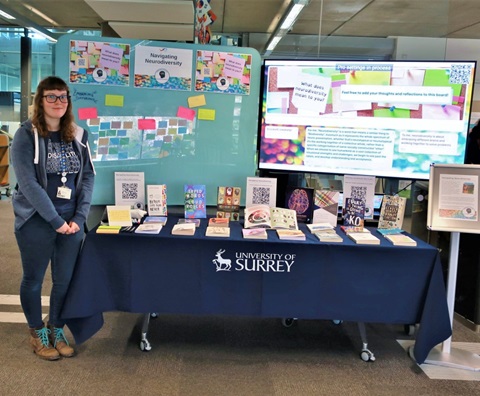
Final Blog Post: I feel so honoured to have been able to celebrate Neurodiversity Celebration Week by collaborating with the library to create this display and reading list!
Throughout the week, I’ve explored a variety of topics around neurodiversity here on the library blog— from neurodiversity and mental health to how neurodivergence intertwines with disability and hearing from our neurodivergent community. I hope these have sparked some conversations, helped open you up to the concept of neurodiversity, and maybe given you some new ideas to think about. By acknowledging and celebrating the variety of different brains in our species, we can build a more equitable world and solve problems together.
A special thank you to everyone who shared their reflections on what neurodiversity means to them on the whiteboard in the library and on our Padlet board. There were some beautiful reflections and thoughts:
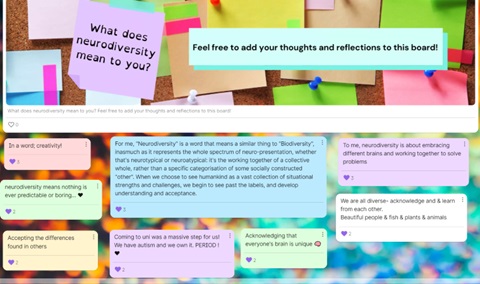
I’d also like to thank the library team for all of their support with this project! If you have a topic that you’re passionate about and would like to add resources to the library’s collection, I highly recommend becoming a student curator. It was a wonderful way to collaborate with a university service that I’ve only ever used for my studies before. It was nice to ‘give back’ a bit and it’s amazing that the library is expanding its collection through collaboration with students. I’m excited to see what other curation projects will happen in the future.
Next week, the books I’ve curated for the library collection will be available for anyone to check out so if you want to reserve one and explore different neurodivergent experiences, then check out my reading list.
If you’d like to learn more about neurodiversity or connect with neurodivergent people at Surrey, I encourage you to join one of our Neurodiversity Networks either as a member or as an ally. Let’s build a community at Surrey that celebrates and embraces differences!

